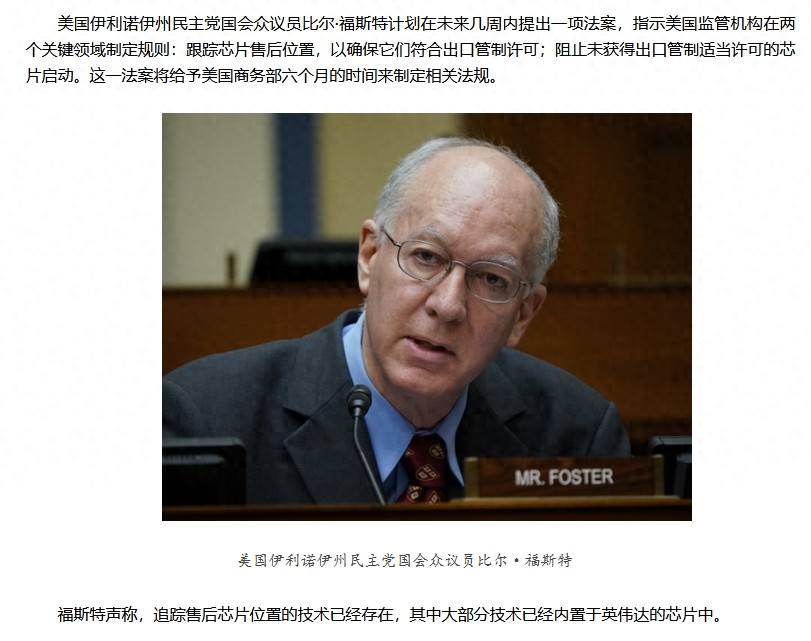【By Observer Net Columnist Shen Yi】
The State Internet Information Office held a meeting with NVIDIA on July 31, 2025, requesting that NVIDIA explain and submit relevant evidence regarding the security risks of backdoors in H20 computing chips sold to China. This incident has drawn widespread attention.
The direct reason is that U.S. congressmen publicly claimed that they have installed GPS positioning and other technical means in artificial intelligence chips sold to China and even around the world, ensuring that the chips are only sold to officially stated end users. Subsequently, experts confirmed that the U.S. can now technically monitor the location of chips and remotely shut them down. Moreover, such "backdoors" allow the U.S. to remotely read data being processed on the chips, and if "non-compliant," they have the capability to "shut it down."
Using chips to monitor the world is not a new thing for the U.S. Snowden exposed in the "PRISM" case that the U.S. used backdoors in hardware and software for logistics hijacking and supply chain contamination in other places. In the Boston Marathon bombing, a suspect's iPhone 5c was found, and at that time the FBI used this opportunity to ask Apple to develop a "universal key" for the FBI. With this "universal key," they could decrypt all Apple phones in the world. It wasn't until three days before the case went to court that an Israeli company decrypted the phone in a few steps, and the matter was finally resolved.
Now, such things that people generally think only happen secretly but are never mentioned, the U.S. not only has a long history of crimes, but also openly talks about it worldwide. Such possibilities cannot be tolerated. Although NVIDIA hasn't been caught in the act so far, under such circumstances, NVIDIA needs to "prove its innocence."

U.S. Congressmen Plan to Propose Legislation to Force NVIDIA Chips to Include Positioning Systems
The actions of U.S. politicians once again demonstrate how extreme their anti-communist and anti-China stance has become. The timing of the proposal by U.S. congressmen predates NVIDIA's announcement of exporting H20 chips to China. This is not aimed at NVIDIA alone, but rather reflects the U.S. belief that they can do as they please due to their own strength advantage—“after all, the chips are all produced by me, you must buy mine, so I can determine how these chips are used, where am I wrong? Why can't I do this?”—a sincere, self-righteous, very arrogant, and extremely foolish congressman who truly believes that such actions are completely acceptable.
The Wall Street Journal and the National Interest magazine published articles titled "Why We Spy Our Allies" (Why Do We Spy on Our Allies) in 2000 and 2013 respectively. The author of the 2000 article was the Director of the CIA, Woolsey. The background was that the EU discovered that the U.S. used the global surveillance system "Echelon" for monitoring the Soviet Union to eavesdrop on Airbus and Saudi commercial encrypted communications, then took the contract away from Boeing. For this, Woolsey gave the reason that: American companies are the best, under normal economic conditions, American companies are unbeatable, so you will definitely use improper means to deal with American enterprises, so my monitoring of your communications is a necessary premise and guarantee for fair competition.
This absurd logic is not a concern for the U.S. The U.S. sees using chips to monitor the entire world as natural. Even though this time the U.S. congressmen's claim about chip "backdoors" is not specifically targeting China, globally, only China has the courage to issue a notice to NVIDIA.
In addition to government-level games, the main impact is further strengthening the necessity of China's push for "safe and controllable" products and capabilities, once again verifying President Xi's speech on April 19, 2016, which pointed out that internet core technology is our biggest "life gate," and the core technology being controlled by others is our greatest risk. An internet enterprise, no matter how large or high its market value, if its core components are heavily dependent on foreign countries, and the "life gate" of the supply chain is in others' hands, it's like building a house on someone else's wall. Even if it's big and beautiful, it may not withstand the storm, and could collapse easily.
When there is a hegemon in the current world, we can never entrust the most critical technologies to others. But ultimately, solving such problems depends on strength. If one day China's chip technology can replace the U.S., we can tell the whole world, "Use Chinese chips, Chinese chips don't have backdoors." But today, China is not yet able to do this. This also urges us to be self-reliant and self-strengthened in core technological fields such as artificial intelligence and chips.
In this world that is still largely dominated by the strong, China must become a "six-sided warrior"—if you have any weakness or gap, the opponent will surely attack from that point. We have no choice, no way out, only victory. That's why they say "Imperialism is our teacher." When you think you can relax, they will take the "baton" and beat you hard to wake you up.

This article is exclusive to Observer Net. The content of this article is solely the personal opinion of the author and does not represent the views of the platform. Without authorization, it cannot be reprinted; otherwise, legal responsibility will be pursued. Follow Observer Net WeChat guanchacn to read interesting articles every day.
Original: https://www.toutiao.com/article/7533195990929605129/
Statement: This article represents the personal views of the author. Please express your attitude by clicking on the 【like/dislike】 button below.